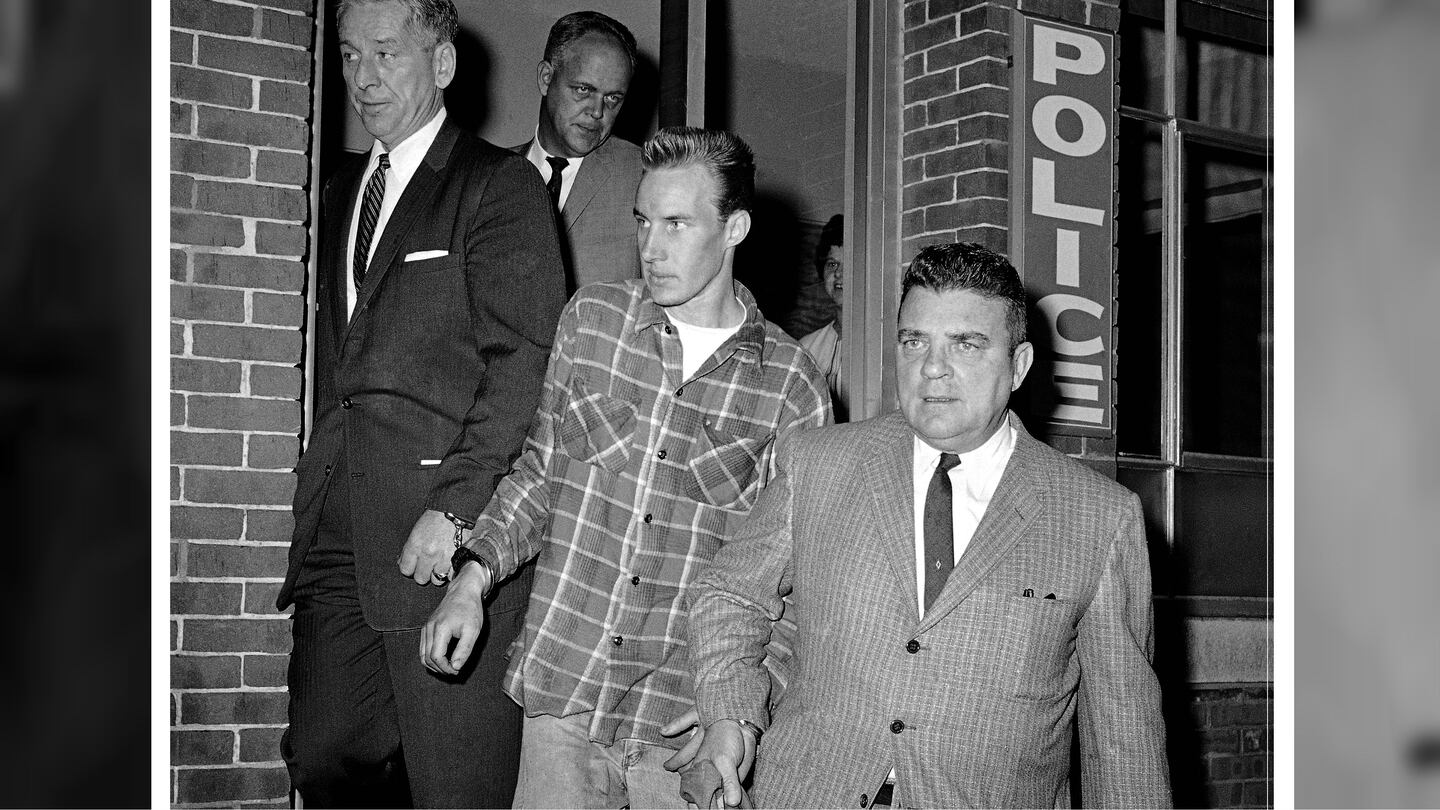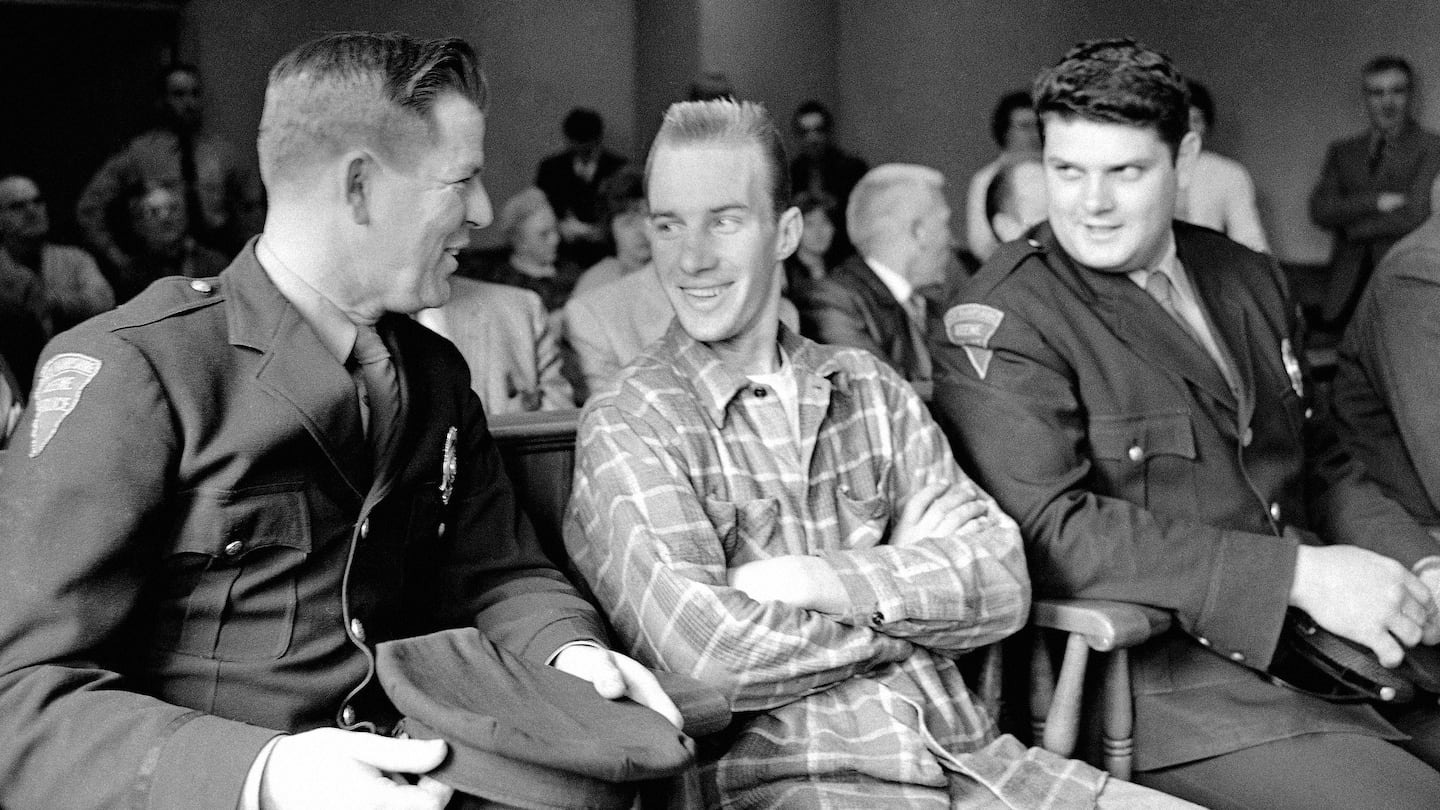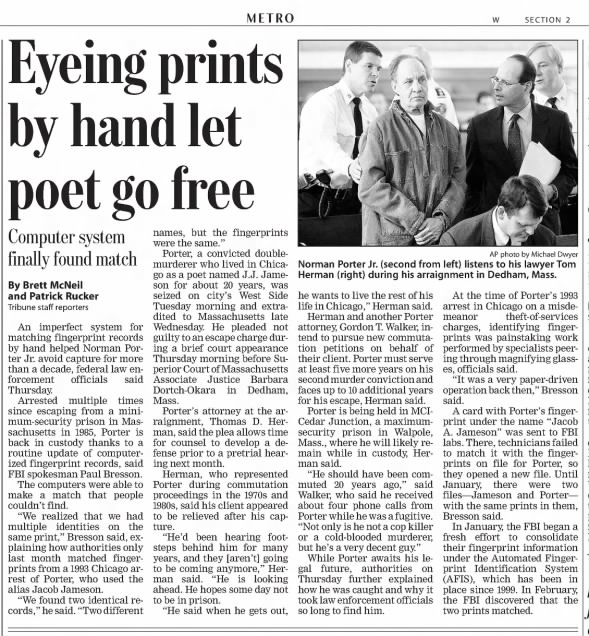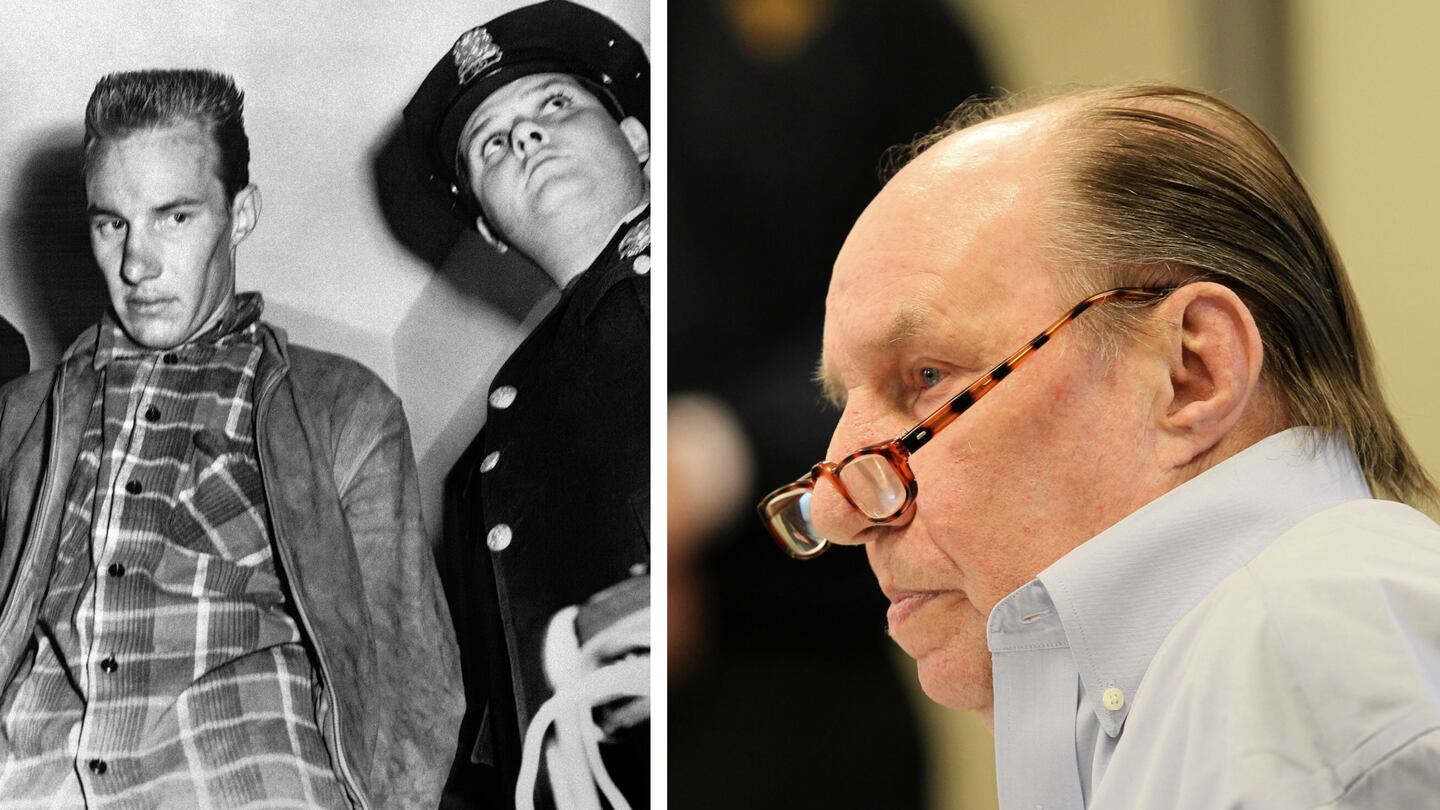SHIRLEY, Mass. — Convicted Massachusetts killer Norman Porter, who escaped on a weekend furlough in 1985 and remained free until he was captured 20 years later living as a poet and activist in Chicago, is seeking a medical release from prison, citing his failing health amid the COVID-19 pandemic.
Porter’s attorney, Thomas Herman, told WFXT in Boston that his client, now 80, suffers from health issues that put him in danger of contracting the coronavirus. Herman has filed a petition with the Massachusetts Department of Corrections for medical parole.
“This is not an end of life petition,” Herman told the news station. “Although, given his susceptibility to the virus, he is at high risk with heart and lung disease, so, we’d hate to see the sentence he is serving now become a death sentence.”
Records show Porter is currently housed at the Souza-Baranowski Correctional Center in Shirley, which is the state’s maximum-security prison.
BREAKING: “Killer Poet” Norman Porter files for Medical Parole amid Covid-19 crisis. Porter serving life for Saugus, MA murder. In 1985, Porter escaped prison. Caught 20 yrs. later in Chicago living as Poet & activist. My exclusive story @boston25 6P #truecrime pic.twitter.com/Xikspcoebr
— Bob Ward Boston 25 (@Bward3) April 30, 2020
>> Coronavirus: Know the facts directly from the CDC
>> Coronavirus symptoms: What you need to know
The ‘Killer Poet’
Porter, described as one of Massachusetts’ most notorious killers, made national headlines in 2005 when he was found living and working in Chicago. Over the two decades he was a fugitive, he had made it to the top of the state’s most wanted list -- even ahead of mobster James “Whitey” Bulger.
The “Killer Poet” has a long and tangled history that began on Sept. 29, 1960, when the then-21-year-old petty criminal and an accomplice, Theodore Mavor, went into a Saugus clothing store armed with a sawed-off shotgun and a handgun and robbed the place. According to state parole board records, the pair shot and killed a 22-year-old store clerk, John “Jackie” Pigott.
Pigott was killed by the shotgun, which court records indicate Porter was carrying. The store manager, Ralph Fabiano, was wounded with the handgun carried by Mavor but survived the shooting.
“While being detained for this crime at the Middlesex County Jail in East Cambridge, Porter secured a firearm and conspired with another inmate to escape,” the board wrote in a 2015 parole denial letter. “During the escape, the other inmate took Porter’s firearm and shot and killed the jail master, David Robinson.”
Porter’s accomplice in the escape, Edgar Cook, who was awaiting trial in the killing of a Cambridge police officer, shot and killed himself three days later as police zeroed in on him in Boston, according to the Officer Down Memorial Page. Porter was captured in New Hampshire four days after the escape.
Porter pleaded guilty on Halloween 1961 to the murder of the 53-year-old Robinson. He was sentenced to life in prison.
He pleaded guilty the following May to second-degree murder in Pigott’s shotgun killing, court records show. Porter also pleaded guilty to charges stemming from two other robberies.
“In all, Porter pleaded guilty to nine felony indictments arising out of three separate incidents,” according to court records.
He was handed a life sentence, to be served consecutively, or one after the other, with the life sentence in Robinson’s death.
“At that time, Porter also received multiple life sentences for armed robbery while masked, which were ordered to run concurrently with the life sentence for the murder of jail master Robinson,” the board wrote.
Then-Massachusetts Gov. David Dukakis in 1975 commuted Porter’s multiple life sentences to a term of 36 years and six months to life, a sentence that made him immediately eligible to seek parole. Porter, who had earned his high school diploma in prison and was working on college course work, was paroled in Robinson’s murder 19 days after his sentence was commuted.
Over the next decade, as he served his sentence in the Pigott case, Porter escaped from custody twice, the documents reveal. The first time, he voluntarily returned.
When he walked away from the Norfolk Pre-Release Center in December 1985, he never looked back.
A parole violation warrant was issued in January 1986, but Porter eluded capture for nearly two decades. Authorities located him in Chicago on March 22, 2005, after fingerprints from a 1993 arrest there were matched to those of the missing fugitive during a routine update of the FBI’s computerized fingerprint database. See details of the fingerprint match in the news clipping below.
The man in Chicago went by the name Jacob Jameson.
“During his time in Chicago, Porter assumed the name Jacob A. Jameson (J.J. Jameson), established himself as a poet, lectured at a local church and worked as a handyman,” the parole board wrote.
Stunned friends and acquaintances
An archived 2005 CBS Chicago story gave a glimpse into Porter’s life in the Windy City, where he was described as a poetry-writing anti-war advocate devoted to his work at a local Unitarian church.
Porter was arrested at the office of the Oak Park Third Unitarian Church, according to the news station.
“He had us all fooled,” said C.J. Laity, who told the CBS affiliate that he knew Porter from poetry readings. “I’ve known him for many, many years. Obviously, I didn’t know him as well as I thought.”
Porter was extradited back to Massachusetts, where a Norfolk Superior Court judge handed him a three-year sentence for the escape. That sentence was to be served consecutive to his sentence in the Pigott murder.
Porter again became eligible for parole in 2009.
He was denied parole at that time because he had not held a job in prison or participated in any programs while behind bars. The board also noted a long history of alcohol abuse in Porter’s past, the 2015 document stated.
At the 2015 parole hearing, Porter apologized to the victims’ families and said his past mistakes had been offset by the “good deeds and hard work” he had put in while on the run in Chicago, the board wrote.
He also denied being the one who killed Pigott, accusing Mavor of the murder and stating that he shot Fabiano, the store manager who survived.
“It is worth noting, however, that Porter’s criminal record contains more than one conviction for possession of a sawed-off shotgun,” the board wrote. “Regarding the murder of jail master Robinson, Porter admits to participating in the escape but denies that he introduced the firearm.”
Porter’s denial also contradicts his alleged confession, in which court records indicate he told authorities he shot Piggot in the neck by accident.
“Mavor said, ‘This is a hold-up. Everybody into the back room,’” the records state. “Porter herded the customers and clerks into the back room and told them to get out their wallets. He had the shotgun pointed at the racks of clothing.
“Hearing a commotion behind him, he turned and the shotgun went off. He saw a man fall to the floor.”
Porter has denied planning his 1985 escape beforehand, though the board wrote that at his 2009 parole hearing, he had admitted to hiding $3,000 in the woods outside the Norfolk Pre-Release Center and, after escaping, using it to travel to Chicago.
“Later in the (2009) hearing, Porter even admitted that he escaped following three denials of commutation on the Pigott sentence and that he had lost hope of being released,” the board wrote in 2015.
The board wrote that Porter denied having an alcohol problem, despite evidence from his past -- including a 1989 DUI arrest in Illinois. He also claimed a “crime-free lifestyle” while living as Jameson but had been arrested in 1990 for shoplifting and in 1993 for theft of services.
“The board’s 2009 decision remains as relevant now as it did then,” the board wrote in 2015. “Rather than address his history of alcohol abuse, Porter has instead chosen to remain in a state of denial.
“Further, he has not had any rehabilitative programming that addresses his criminal behavior. He is still not suitable for parole.”
Porter had several supporters at his last bid for release, including former prison officials and friends from Chicago. He had a larger number of opponents to parole, including family members of the two men killed.
The families remain opposed to Porter’s release following his request for medical parole.
“I believe that he deserves (life in prison for) what he has done, and he needs to pay for the crimes he committed: taking two lives, impacting so many families,” Dottie Johnson, Pigott’s cousin, told WFXT. “The pain and anguish have not gone away.”
The Essex County District Attorney’s Office also plans to file papers next week arguing against his release, the news station reported.











